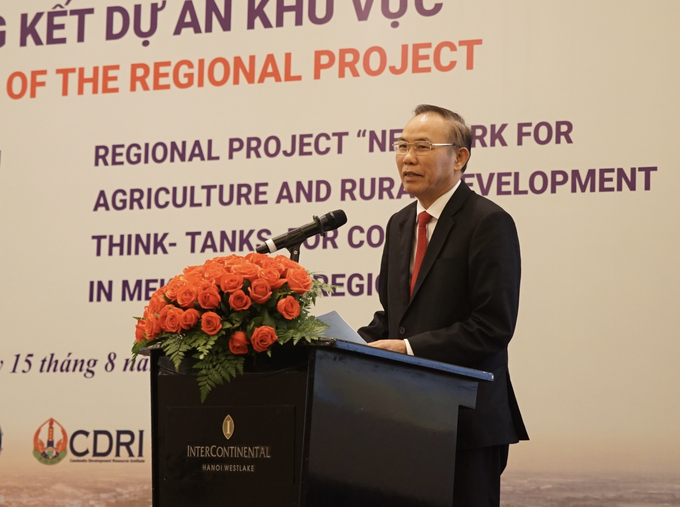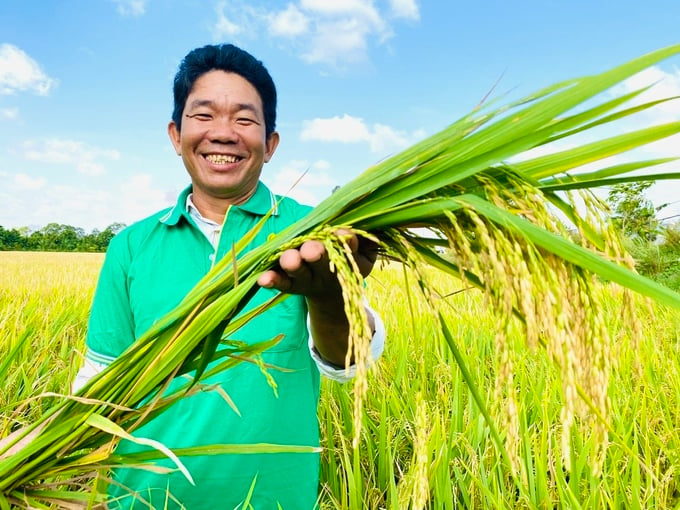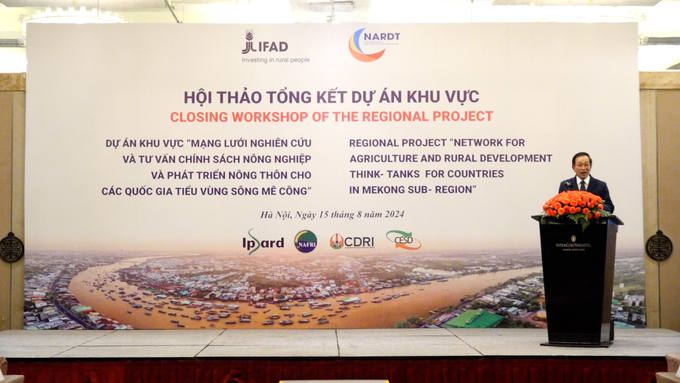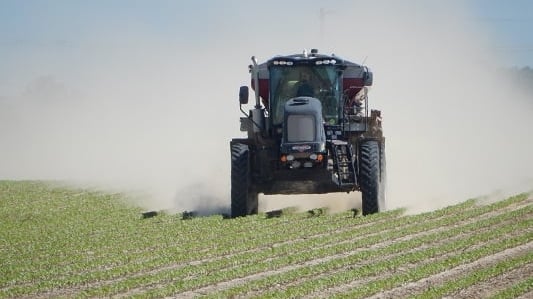May 18, 2025 | 03:53 GMT +7
May 18, 2025 | 03:53 GMT +7
Hotline: 0913.378.918
May 18, 2025 | 03:53 GMT +7
Hotline: 0913.378.918

Deputy Minister of Agriculture and Rural Development Phung Duc Tien assessed that the NARDT project has made significant contributions to the development of important policies for Vietnam's agricultural sector. Photo: Linh Linh.
The International Fund for Agricultural Development (IFAD) and the Institute of Policy and Strategy for Agriculture and Rural Development (IPSARD) jointly organized the Closing Workshop of the regional project "Network for Agriculture and Rural Development Think Tanks for Countries in the Mekong Sub-Region" (NARDT) in Hanoi on August 15.
IPSARD implements the initiative, which is financed by IFAD. The project comprises two components: the establishment of a network to share, research, and consult policies, as well as the support of the establishment and operation of the NARDR network at the regional and national levels. The second component is designed to facilitate the sharing of knowledge, research capabilities, and policy dialogue to facilitate the implementation of the national and regional network's action plan. This includes the sharing of knowledge, capacity enhancement, and collaborative research.

The agriculture and rural development sector is promoting transformation towards ecological agriculture, modern rural areas, civilized farmers, increasing added value, and sustainable development, in which regional cooperation is emphasized. Photo: Le Hoang Vu.
Phung Duc Tien, the Deputy Minister of Agriculture and Rural Development in Vietnam, stated that the project has assisted the Ministry of Agriculture and Rural Development (MARD) and the Central Economic Commission in the research and assessment of the COVID-19 pandemic through IPSARD. This has facilitated the development of policies and mechanisms to assist the public and businesses, particularly during the subsequent economic recovery phase. It has also contributed to the development of policies and mechanisms, including Resolution 19 on agriculture, farmers, and rural areas until 2030, with a vision to 2045, and Decision 150 on the Strategy for Sustainable Agricultural and Rural Development for the period 2021-2030, with a vision to 2050.
Furthermore, strategies have been designed for the forestry, livestock, agricultural, and fisheries sectors. Also, the development of policies on insurance and reinsurance has been facilitated by the contributions of competent experts with extensive expertise, which has facilitated the sustainable development of agriculture.
The agriculture sector is currently in the process of transitioning to ecological agriculture, modern rural areas, and advanced producers. This transition is aimed at promoting sustainable development and enhancing added value, with a particular emphasis on regional cooperation. The positive results of Vietnam's agricultural sector in recent years have been facilitated by the development of policies and mechanisms. In addition to its domestic policies, Vietnam is also involved in and contributes to regional issues that have direct consequences, particularly in the context of profound integration.
"The practical significance of the collaboration and experience-sharing among countries in the region is that it allows them to learn from one another and develop together. The project has strengthened cooperation and created opportunities for stakeholders to participate widely in the research and development of MARD policies, establishing a policy research network from the government to the private sector, after five years of implementation, with assistance from IFAD and active cooperation among Vietnam, Laos, Cambodia, and Myanmar", noted Deputy Minister Phung Duc Tien.

Secretary of State Ministry of Agriculture, Forestry and Fisheries of Cambodia, Dr Sen Sovann, speaking at the workshop. Photo: Quang Dung.
Secretary of State Ministry of Agriculture, Forestry and Fisheries of Cambodia, Dr Sen Sovann, observed that the agriculture of the Mekong subregion countries shares numerous similarities. He shared the project's results. The project's implementation has contributed to the consolidation of knowledge and the strengthening of policies in the fields of agriculture and rural development. As well as "transforming" values into tangible outcomes, the initiative has facilitated cultural exchange, human cooperation, and enhanced support for farmers in the region.
Mr. Sovann said that Cambodia is interested in acquiring knowledge and implementing Vietnam's successful research and policies on food security, value chain development, and models that improve the efficiency and productivity of agricultural production, thereby ensuring the livelihoods of people and safeguarding the environment.
Somsamay Vongthilath, a representative from the Ministry of Agriculture and Forestry of Laos, stated that the NARDT project has aided in the consolidation of research, thereby improving agricultural and forestry policies in Laos. This includes the development of the Green Growth Plan in agriculture, the Crop Restructuring Scheme, and the drafting of the Public-Private Partnership (PPP) Decree in agriculture. The initiative has facilitated the development of the PPP Scheme in agriculture and the Development Plan for Key Agricultural Value Chains in Cambodia.
The network in each country has continued to expand after five years of implementation. The domestic network in Vietnam has expanded to 30 members, while in Laos and Cambodia, it has each reached 20 members.
The regional policy advisory network has collaborated to address numerous shared concerns through workshops and policy dialogue conferences, while also gaining insight from successful models, innovative developments, and successful policies in a variety of countries. The regional network has also played a role in the direction of project research, particularly in the context of regional studies within the project.
The successful organization of numerous training sessions, which were designed to improve the capabilities of researchers in these countries, particularly those who are directly engaged in the studies and are young, is another significant result of the project. The content of these training programs is frequently associated with ongoing research and is tailored to the specific requirements of the countries. This method is both practical and effective, as it enhances the content of the research and improves the skills of research teams.
Translated by Dieu Linh

(VAN) Hue City rigorously enforces regulations regarding marine fishing and resource exploitation, with a particular emphasis on the monitoring of fishing vessels to prevent illegal, unreported, and unregulated (IUU) fishing.

(VAN) Hanoi People's Committee has issued a plan on reducing greenhouse gas emissions in the waste management sector with 2030 vision.

(VAN) Vietnam's draft amendment to Decree No. 156 proposes a mechanism for medicinal herb farming under forest canopies, linking economic development to population retention and the sustainable protection and development of forests.

(VAN) In reality, many craft village models combined with tourism in Son La have proven effective, bringing significant economic benefits to rural communities.

(VAN) The international conference titled Carbon Market: International experiences and recommendations for Vietnam was successfully held recently in Ho Chi Minh City.

(VAN) According to the Project on rearranging provincial and communal administrative units, in 2025, the country will have 34 provinces/cities, 3,321 communes, wards, and special zones, and no district-level organization.

(VAN) The vice president of fertilizer with Stone X Group says the Trump administration’s tariffs are impacting fertilizer markets.